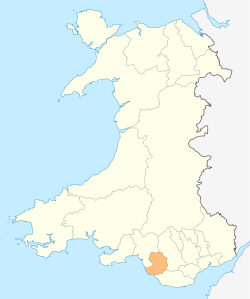Ewenny Priory
Ewenny Priory (Welsh: Priordy Ewenni), in Ewenny in the Vale of Glamorgan, Wales, was a monastery of the Benedictine order, founded in the 12th century.
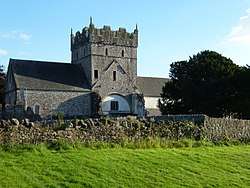
The priory was unusual in having military-style defences and is widely regarded as one of the finest fortified religious buildings in Britain. Over the centuries the priory has sustained some damage, and following the Dissolution of the Monasteries, was, like many of its kind, converted into a private house, Ewenny Priory House, which is still inhabited by its current owners, the Turbervill family. The priory is not open to the public apart from the church, where restoration work has been carried out by Cadw. The nave serves as the parish church (Church in Wales).[1]
History
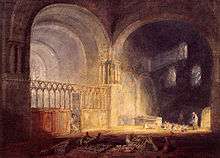
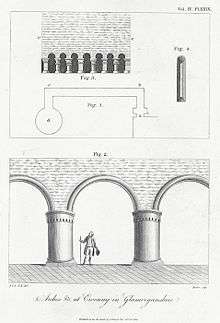
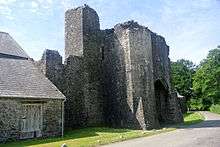
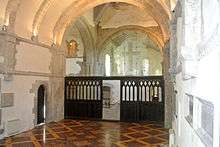
The priory was founded in 1141 by Maurice de Londres when he granted the nearby Norman church of St. Michael to the abbey of St. Peter at Gloucester (now Gloucester cathedral), together with the churches of St Brides Major, St. Michael at Colwinston and the manor at Lampha. The church had been built in the 12th century by his father, William de Londres, one of the Norman knights of Glamorgan. The village of Ewenny grew around the Priory and church.
The priory was dissolved in 1536, and leased in the same year to Sir Edward Carne. In 1545 he purchased the priory, along with its possessions. The estate descended in the Carne family to Edward Carne (died 1650) who was succeeded by his two daughters and co-heirs, Blanche and Martha. Blanche (d 1685) inherited Ewenny, and married her cousin Colonel Sir John Carne (died 1682), of Corntown, near Bridgend. Their son Richard Carne (c.1669-1713) of Ewenny was succeeded by his two sisters and co-heirs, Frances (d 1714) the wife of Edward Turbervill of Sutton, and Jane (d 1741). Edward and Frances Turbervill were succeeded by their son Richard Turbervill, who became the sole owner of the Ewenny estate on the death of his aunt Jane in 1741.
From Richard the estate descended to Richard Turbervill Picton, who changed his name to Richard Turbervill Turbervill and died in 1819. He was succeeded by his son Richard Turvervill Turbervill (d 1848), who was succeeded in turn by his brother Colonel Gervase Powell Turberville, who died childless c.1862. The estate then passed to his great-nephew Lieutenant-Colonel Thomas Picton-Warlow (died 1892), who changed his name to Thomas Picton-Turbervill in 1867 and from him passed down in the Picton-Turbervill family for several generations.
The church is a Grade I listed building, the house is Grade II*.[2][3]
References
- "Website for the Priory Church". Archived from the original on 8 May 2006. Retrieved 12 December 2019.
- Ewenny Priory (house), Ewenny, British Listed Buildings.Retrieved 17 August 2013.
- Ewenny Priory Church, Ewenny, British Listed Buildings.
- "Glamorgan Archives Ewenny Collection of Records". Archives Wales. Archived from the original on 23 May 2012. Retrieved 5 July 2013.
External links
| Wikimedia Commons has media related to Ewenny Priory. |
